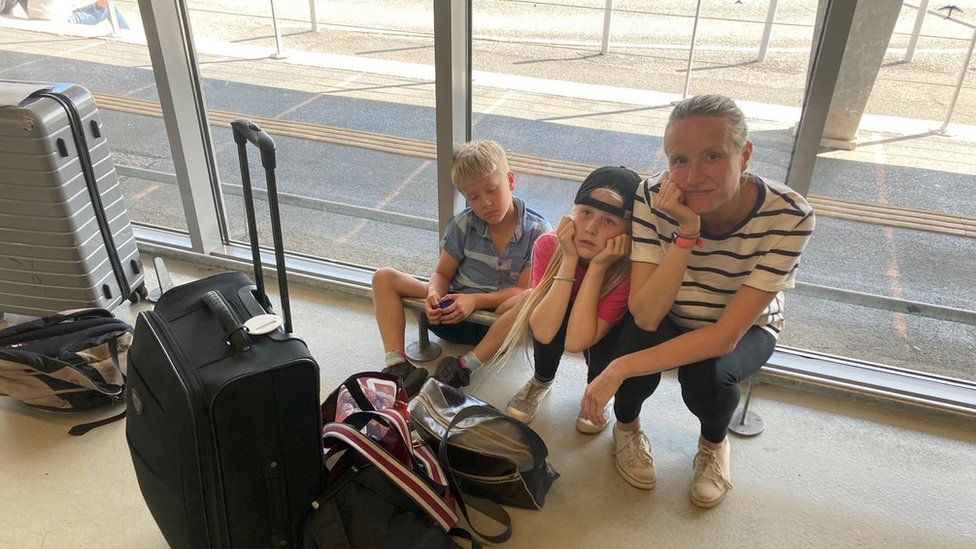ARTICLE AD BOX
 Image source, PA Media
Image source, PA Media
Rory Dollard's family were stuck in France last summer after having their flight cancelled
By Katy Austin & Tom Espiner
Transport correspondent & reporter
Air traffic chaos over last year's August bank holiday was made worse by on-call engineers being unable to fix the issue from home, a report has said.
More than 700,000 passengers were affected by an air traffic meltdown that had knock-on effects for days.
Industry group Airlines UK said the report, compiled for the Civil Aviation Authority, showed air traffic control processes were "wholly inadequate".
Air traffic provider NATS said it had made "improvements" since last summer.
About three quarters of a million passengers were affected by the incident - which caused widespread cancellations on a bank holiday Monday - with "considerable financial and emotional consequences", the report said.
That includes 300,000 people hit by cancellations, 95,000 by long delays of more than three hours, and a further 300,000 by shorter delays. Airlines have said they incurred tens of millions of pounds in costs.
On 28 August last year, a busy bank holiday Monday, there was a major technical failure at NATS which led to widespread flight disruption that left thousands of passengers stranded.
An independent interim report into what went wrong, which was commissioned by the Civil Aviation Authority, found the problem started when the NATS system struggled to cope with an unusual flight plan and shut down. A backup system also shut down, leaving manual processing of flight plans as the only option.
NATS engineers working on site could not fix the issue, so the problem was escalated to on-call engineers higher up the chain.
It took one of the senior engineers an hour and a half to get to the NATS site and try to perform a system restart, which was not possible remotely.
When that did not work help from another engineer was not sought for more than three hours after the initial failure, and system manufacturer Frequentis was called in after four hours.
Watch: The day UK air traffic control went down... in 71 seconds
The report said improvements to resilience planning would be needed to prevent a similar meltdown in future.
There does not seem to have been any rehearsal of how to manage such an incident, despite that being "best practice" and common in other sectors.
The report describes "a significant lack of pre-planning and coordination" between different parts of the industry for unusual "major events and incidents". It also outlines how airlines and airports have expressed concerns about delays in being warned that there was a problem, and "limited explanation" during the event. Communication issues, the report says, "resulted in more uncertainty and more severe impacts on passengers and others than was necessary". It also said some airlines told passengers they had to make their own plans to get home, with "misinformation" about their rights. An example was given of a passenger and her child stranded abroad being handed a leaflet saying they should make their own arrangements and then claim reimbursement.
They could only find flights four or five days later. The airline said it would only reimburse for one overnight stay. It cost them £900. However, there were some good examples of individuals being offered all the appropriate assistance. The panel said the scale of disruption made providing care and assistance much harder, as so many people were stranded at the same time, on a busy bank holiday.
Airports, restaurants and hotels, and most importantly alternative flights, quickly became full. While airlines made "huge efforts" to be there for customers in many cases, there were incidents where "incomplete or incorrect information was given about passenger rights", food vouchers were not accepted or not enough hotel accommodation was offered. Tim Alderslade, the chief executive of Airlines UK said the interim report "contains damning evidence that NATS' basic resilience planning and procedures were wholly inadequate and fell well below the standard that should be expected for national infrastructure of this importance". He added further investigation would lead to recommendations in the final report "so that this kind of catastrophic failure is not allowed to happen again".
NATS said it had "cooperated fully" with the investigation.
"We have not waited for the panel's report to make improvements for handling future events based on learning from the experience of last year," the air traffic provider said.
"These include a review of our engagement with our airline customers, our wider crisis response and our engineering support processes."

 1 year ago
58
1 year ago
58








 English (US) ·
English (US) ·